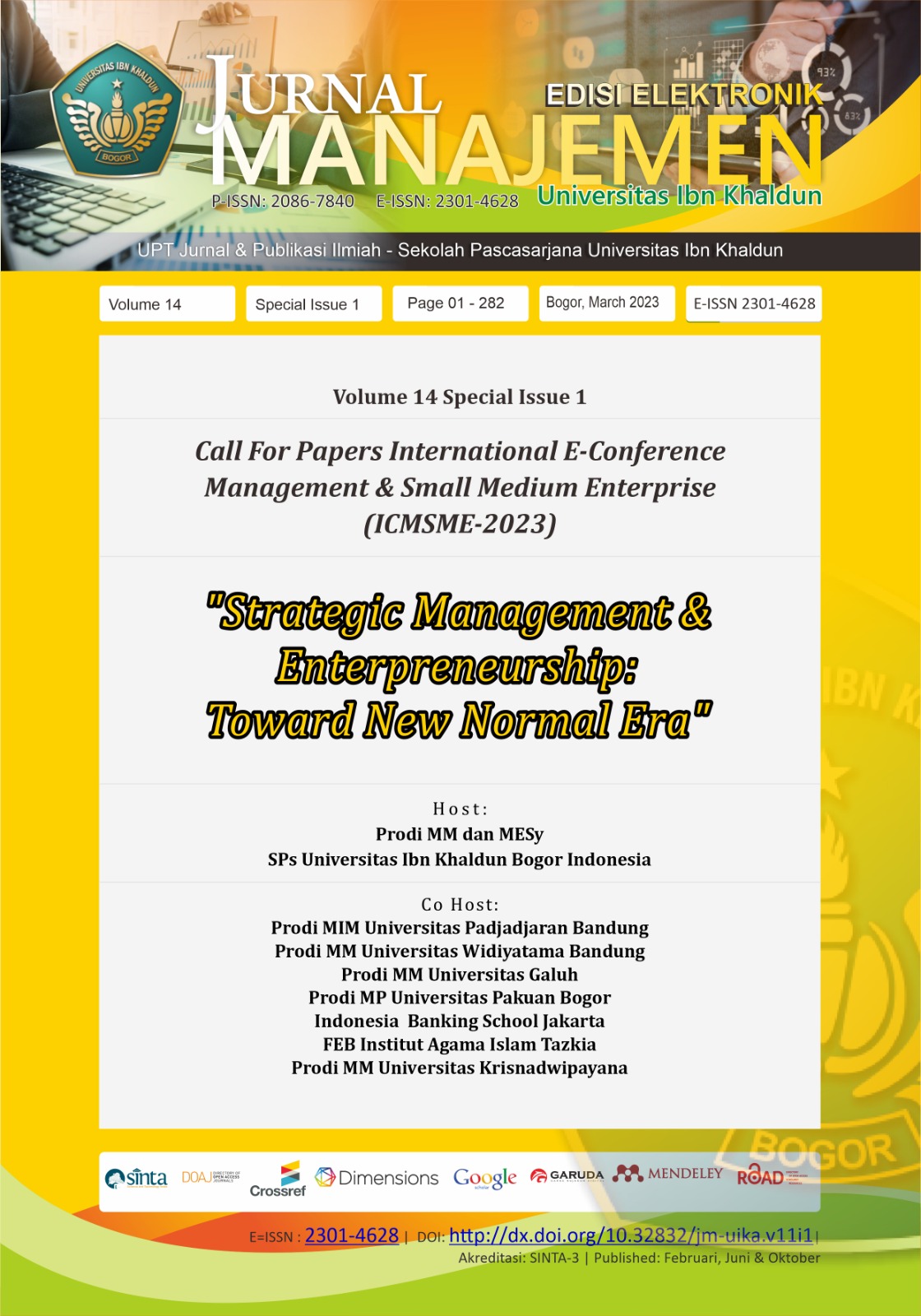Financial Literacy for Better Access to Finance, Financial Risk Attitude, and Sustainability of MSMEs in Indonesia
DOI:
https://doi.org/10.32832/jm-uika.v14i1.9792Abstract
MSMEs are one of the sectors affected by the Covid-19 Pandemic in Indonesia, where most of them have experienced a decline in income and many have experienced capital difficulties. Based on data, only a few MSMEs in Indonesia receive financing from financial institutions. While based on previous research, financial literacy is an important factor for MSMEs to get access to finance and can improve their business sustainability. This study aims to analyze the direct effect of Financial Literacy on the sustainability of MSMEs, and indirect effect if mediated by Access to Finance and the Financial Risk Attitude for MSMEs in Indonesia. This study used the Path Analysis model, with primary data from online questionnaires obtained by the snowball sampling method on MSME managers/owners, and for data processing with SmartPLS software. The results showed that Financial Literacy affects MSME's Sustainability, Access to Finance, and Financial Risk Attitude. In this study, Financial Literacy has the greatest influence on Access to Finance. However, Access to Finance and Financial Risk Attitude has no effect on Sustainability and has not succeeded in moderating the relationship between Financial Literacy and the Sustainability of MSMEs. It can be seen that MSMEs in Indonesia may still not have a long-term business development plan and are accustomed to managing business finances in a conventional way, where it has not been able to take advantage of external sources of financing and still minimizesReferences
Aduda, J., & Kalunda, E. (2012). Financial Inclusion and Financial Sector Stability With Reference To Kenya: A Review of Literature. Journal of Applied Finance & Banking, 2(6), 95–120. https://econpapers.repec.org/article/sptapfiba/v_3a2_3ay_3a2012_3ai_3a6_3af_3a2_5f6_5f8.htm
Al-Qudah, A. A., & Houcine, A. (2021). Stock Markets' Reaction to COVID-19: Evidence From The Six WHO Regions. Journal of Economic Studies. https://doi.org/https://doi.org/10.1108/JES-09-2020-0477
Antaranews.com. (2021). https://www.antaranews.com/berita/2450281/presiden-jokowi-minta-penyedia-layanan-lakukan-literasi-keuangan. Diakses pada 18 Januari 2022 pada pukul 18.36.
Awais, M., Fahad Laber, M., Rasheed, N., & Khursheed, A. (2016). Impact of financial literacy and investment experience on risk tolerance and investment decisions: Empirical evidence from pakistan. International Journal of Economics and Financial Issues, 6(1), 73–79.
Conner, K.R.; Prahalad, C.K. (1996). A resource-based theory of the firm: Knowledge versus opportunism. Organization Science, 7, 477–501.
Das, T.K.; Teng, B.-S. (2000). A resource-based theory of strategic alliances. Journal Management, 26, 31–61.
Jacob, K., Hudson, S., & Bush, M. (2000). Tools for Survival: An Analysis of Financial Literacy Programs For Lower-Income Families. RSA Journal, 2012(June 1), 24–27.
Jawapos.com. (2021). https://www.jawapos.com/ekonomi/21/03/2021/umkm-terdampak-pandemi-yang-bisa-akses-kredit-ke-bank-sedikit/. Diakses pada 1 Februari 2022 pada pukul 13.56.
Kadoya, Y. & Khan, M.S.R. (2020). Financial literacy in Japan: New evidence using financial knowledge, behavior and attitude. Sustainability, 12, 3683.
Kemenkeu.go.id. (2021). https://www.kemenkeu.go.id/publikasi/berita/pemerintah-terus-perkuat-umkm-melalui-berbagai-bentuk bantuan/#:~:text=Berdasarkan%20data%20Kementerian%20Koperasi%20dan,Rp8.573%2C89%20triliun. Diakses pada 20 Januari 2022 pada pukul 20.43.
OJK. (2021). Strategi Nasional Literasi Keuangan Indonesia 2021-2025.
Rauch, A.; Frese, M. (2000). Psychological approaches to entrepreneurial success: A general model and an overview of findings. International Review Industry Organization Psychology, 15, 101–142.
Safitri, N. A., & Sukirman. (2018). Analisis Faktor-Faktor Yang Mempengaruhi Financial Behavior. Economic Education Analysis Journal, 2(3), 1–8.
Sekaran, U. (2005). Research Methods For Business (Fourth). United States: John Wiley & Sons Inc.
Smesco.go.id. (2021). https://smesco.go.id/berita/hari-umkm-nasional-2021-umkm-kuat-bangsa-berdaulat. Diakses pada 20 Januari 2022 pada pukul 21.01.
Suhartanto, D. (2020). Analisa Data Untuk Riset Bisnis : SPSS, AMOS , PLS (2nd ed.). Politeknik Negeri Bandung.
Willebrands, D., Lammers, J., & Hartog, J. (2012). A successful businessman is not a gambler. Risk attitude and business performance among small enterprises in Nigeria. Journal of Economic Psychology, 33(2), 342–354. https://doi.org/10.1016/j.joep.2011.03.006
Ye, J., & Kulathunga, KMMCB. (2019). How Does Financial Literacy Promote Sustainability in SMEs? A Developing Country Perspective. Sustainability. 11, 2990. doi:10.3390/su11102990.
Downloads
Published
How to Cite
Issue
Section
License
Authors who publish with this journal agree to the following terms:
- Authors retain copyright and grant the journal right of first publication with the work simultaneously licensed under a Creative Commons Attribution-NonCommercial-ShareAlike 4.0 International License that allows others to share the work with an acknowledgement of the work's authorship and initial publication in this journal.
- Authors can enter into separate, additional contractual arrangements for the non-exclusive distribution of the journal's published version of the work (e.g., post it to an institutional repository or publish it in a book), with an acknowledgement of its initial publication in this journal.
- Authors are permitted and encouraged to post their work online (e.g., in institutional repositories or on their website) prior to and during the submission process, as it can lead to productive exchanges, as well as earlier and greater citation of published work (See The Effect of Open Access).











